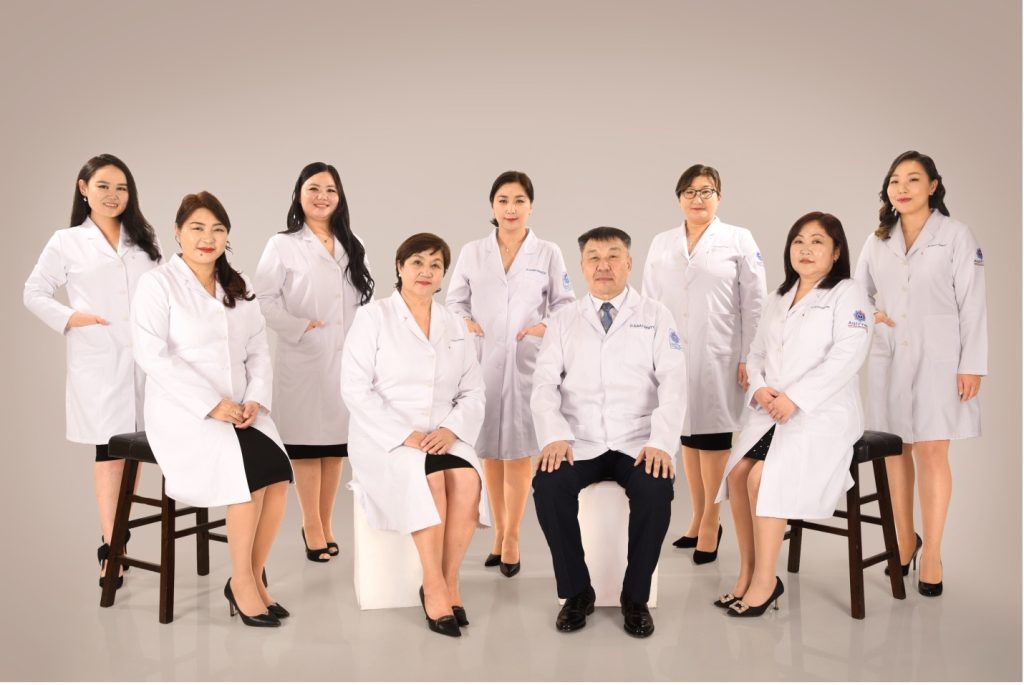Introduction
The department of infectious diseases is one of the oldest departments at MNUMS. As of 2019, there are seven lecturers and one assistant in the department. Three lecturers are specialized in infectious diseases, two are in STIs and the other two are specialized in teaching tuberculosis. Out of the 7 lecturers, one (14.2%) is a Professor, one (14.2%) is an associate professor, three (50%) have Ph.D. in Medical Science, three (42.8%) have MSc in Medical Science and two (28.5%) are consultant physicians. The department carries out undergraduate training in the fields of infectious diseases, STIs, and tuberculosis for the third to sixth-year students of the School of Medicine, fourth-year students of the School of Bio-Medicine, third and fifth-year students of the International University of Mongolian Traditional Medicine, third to fifth-year students of the School of Dentistry, third and fourth-year students of the School of Public Health within the newly implemented +4, +2 curriculums. We offer an online Graduate Program with International Cyber University, the Graduate School of MNUMS, and Postgraduate studies in infectious diseases, tuberculosis, STI in cooperation with the Postgraduate Institute of MNUMS.
The department activities are based at the National Centre for Communicable Diseases (NCCD). The department has carried out two projects on viral hepatitis, one project on STI supported by international funds. The department of infectious diseases organizes not only training, research and professional activities in the field of infectious diseases, tuberculosis and STI but routinely provides health education training to the general population and professional training to doctors and healthcare providers.
Staff handbook
Read more

Aims
The main aim of the department is to organize training, research, professional activities that meet the national and global demands and standards within the field of infectious diseases, tuberculosis and STIs.
Undergraduate training
In terms of the “Medical Doctor Training” +4 curriculum: Total of 6 credit studies for 3-6 year medical students: infectious disease, tuberculosis, and sexually transmitted infections. In terms of the “Paediatrician Training” curriculum: A total of 5 credit studies for 4-6 year medical students. Total of 2 credits for students who are enrolled in year 4 in School of Bio-Medicine: infectious diseases, tuberculosis. International University of Mongolian Traditional Medicine, 2 credits in year 3 of Acupuncture Studies, 2 credits in year 4 of Mongolian Traditional Medicine Studies, 2 credits in year 3 of MMH, total 6 credits: infectious diseases, tuberculosis, and sexually transmitted infections. School of Dentistry, year 5, 1 credit: infectious diseases, tuberculosis. School of Public Health, year 3, 2 credits: infectious diseases, tuberculosis, and sexually transmitted infections. School of Public Health, Occupational health and safety specialist, year 2, 2 credits: infectious diseases, tuberculosis, and sexually transmitted infections. School of Public Health, Nutritionist training, year 3, 2 credits: infectious diseases
Postgraduate training
“Specialist in Infectious diseases” “Specialist in Tuberculosis” each 2 years specialization; “Specialist in STIs” 1-year specialization, Postgraduate training in “Specialist in paediatric Infectious diseases” and other infectious diseases are offered.
Graduate training
Graduate and Doctoral studies in infectious diseases, tuberculosis, STIs. Online Graduate Program with International Cyber University.
